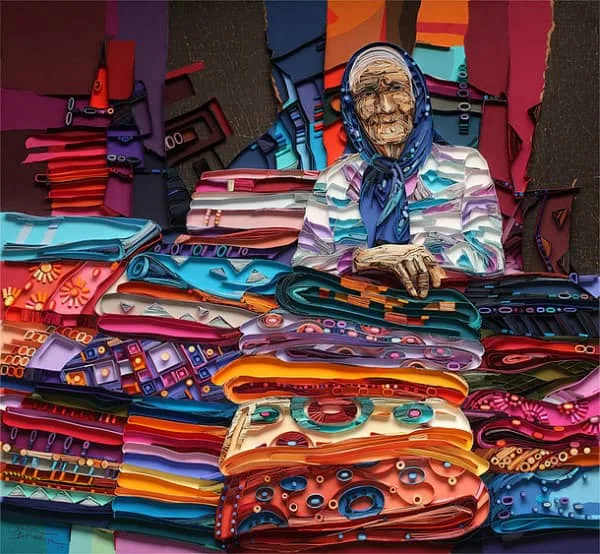Hibiscus Orchid Plumeria Wall Art by Manuela Koosch
of Etsy shop Paper to Petal.
These seemingly solid flowers are indeed made of rolled paper strips.
These seemingly solid flowers are indeed made of rolled paper strips.
Manuela has developed a technique that sets her designs apart.
Possibly no one has been more surprised than myself to find that my attraction to quilling would turn into a second career, but as with most things in life, change happens gradually and one experience leads to the next. In a couple of years it will be two decades since I first spotted quilling in a magazine and was smitten. Over time I've experienced a number of ways to generate income that I offer here as suggestions so you might do the same. I'll also highlight quillers I've had the pleasure of meeting online who are great examples of additional ideas.
Marketing Your Quilling Skills in Person
We'll start with in-person ways to promote your handmade work, as opposed to online marketing. These options are likely a moot point at the moment considering a pandemic is underway, but let's pretend it's over.
After you've gifted enough items to be convinced that people are honestly delighted by your work and that you have a true talent/saleable product, call to set up appointments with local merchants to introduce your wares.... never show up unannounced as chances are you'll arrive at a hectic time and won't receive their full attention.
Sena Runa creates commissioned designs,
stocks an Etsy shop, and is a quilling book author.
Selling in an artisans' shop or gallery means that a commission will lessen your earnings (usually 30% or more of an item's price goes to the shop owner), but the advantage is that you won't need to be present as you would at a craft show, which is how many quillers start out. I began by offering cards in a gift shop and later, jewelry in a fine art gallery. Museum shops often sell handcrafted items, so don't overlook the ones in your area. If your work sells well at the latter, reach out to more distant museums.
Necklace projects I designed for my quilling books.
Consider donating an item to a fundraiser raffle or silent auction. Doing so will bring many eyes to your work, but make sure ahead of time that your name/business name and contact information will appear alongside it. Ask if you can provide a stack of business cards to place on the table. Note that wherever and whatever you sell, your delicate work must be packaged in a secure, yet attractive way. People are often tempted to touch and even pinch quilling to see if it's really paper.
Cecelia Louie of Paper Zen is a quilling and die cut project designer,
YouTube instructor, book author, and Etsy shop owner.
Many local hobby shops and nationwide big box craft stores offer classes and are always on the lookout for skilled teachers with unique talents. Call for an appointment with the owner or manager to show samples of your work, example class projects, and to define what a beginner can expect to learn. Ask whether you must provide supplies, who sets the number of students and class price, and how payment will be received. If you've never taught before, do your homework before showing up for class. Write handouts, a pattern, and practice showing a novice how to quill. It's also a good idea to note how long it takes them to make the project.
Sabeena Karnik is an independent illustrator/typographer who specializes
in paper sculpturing and 3D illustration. Quilled Lilies
was a commissioned project for EMI Production Music.
Not every method I've mentioned will be an income generator, however, even an unpaid opportunity can lead to a commissioned project or teaching job in the future. Reaching out to others to make connections is almost always rewarding, either in real life or online. Action creates its own momentum... one idea will lead to the next as more and more people become aware of what you do.
Marketing Your Quilling Skills Online
Creating a website and/or blog, launching a Facebook business page, posting photos of your work on Instagram, or setting
up Pinterest boards all seem threatening at
first, but in order to be found online, whether you prefer to sell or teach, you'll need to jump in
somewhere. There are many blog posts and YouTube videos that will show
you how to do these things step-by-step, and you can even promote your work via all of these avenues. Put Google to the test of
guiding you through any problem you might have. Join Facebook groups
where members are available around the clock to answer your questions, and do your best to give as much as you get by offering your own tips in return.
Tracy Belair Gaito of Runnerbean Paper Art creates quilled
wedding invitation mats, jewelry, and tiny figurines that can be customized.
She has an Etsy shop, Runnerbean.
Blogs are not read as widely as they once were, but that doesn't mean you shouldn't start one. What you write will give potential customers or quilling students a glimpse of the artisan behind the work they're admiring.... they are more likely to buy or take a class from someone they feel they know. I recommend using your real name and including a photo of yourself on your About page, and please don't use the pronoun we if it's only you behind the scenes. Give yourself credit for being the strong, solo entrepreneur you are.
A custom wedding invitation mat I created that was later framed.
Most importantly, a website or blog and the images you share will help your work to be found via a Google search. There are all sorts of details that can help with this aspect... labeling photos, selecting blog post topics, and even how you name the posts will figure into how easily they are found by others. If photography isn't your strong suit, there are YouTube channels, blogs, and online courses devoted to the subject that will improve your skill immensely. You don't need a fancy camera... I know plenty of artisans who take beautiful photos with their phones. At the same time, I can't stress enough that eye-catching photos are essential in attracting attention to your work.
Yulia Brodskaya is often credited with revolutionizing the art of quilling
in the past decade by creating a new style of on-edge designs
that only sometimes include traditional quilled coils.
She creates commissioned projects, speaks at design
conferences, and has authored a quilling book.
If you decide to sell what you make, have a look at the many Etsy and
Amazon Handmade quilling shops and go
from there... what is it that is special about your designs? Those who
find success have often created a small niche within the quilling world and
focus solely on it. Not that you must have an separate online shop... you
can sell directly from your own website via Shopify, as well as Facebook,
Instagram, or Pinterest. You can even offer your designs as digital
images that are placed on merchandise such as wall prints, phone cases, face masks or dozens of other options via
Zazzle or Society6.
Jennifer Stacy specializes in creating customized art for any occasion
that she sells via her Etsy shop, Quilling Fun. This clever framed piece
was designed to commemorate Nurses' Week.
If you enjoy teaching and technical writing, create project tutorials to sell as PDFs. Start a YouTube channel to demonstrate how to do specific quilling techniques and/or show how to make complete projects. Once you're comfortable in front of a camera, there are quite a few platforms for teaching classes online, such as Skillshare, Teachable, and ipasseo.
Judith + Rolfe creates striking original art, often on a
commissioned basis, and also sells prints and cards.
commissioned basis, and also sells prints and cards.
If you've created (more than) enough original designs to fill a how-to book, and enjoy both conversational and technical writing, you might be a good candidate for becoming a quilling book author. Google craft book publishers and pitch your idea to acquisitions editors one at a time. If you prefer, test the waters by self publishing a manual to sell on Amazon or Etsy or by submitting an article idea and designs to one of the few remaining paper craft magazines. These have dwindled in number in recent years, but there are still good ones in the UK and Germany.
Kasia Wojtasik
creates signature densely quilled floral designs,
often as wedding
gifts, has hosted demos at Creativeworld Trade Show,
and partners with Excel
hand tools and blades.
Now that I've discussed ways to dip into both the real and online quilling worlds (endlessly, ha, thank you for your patience), I'll emphasize again that your design sensibility and technical quilling skills must be strong. A number of the quillers included here are also graphic artists... Yulia Brodskaya, Sena Runa, Cecelia Louie, Tracy Belair Gaito, and Sabeena Karnik, for example, and Judith of Judith + Rolfe is an architect.
I designed these Shooting Star Earrings as a project in my book,
Allison Bartkowski of Quilled Creations, Diane Crane of JJ Quilling Design [edit: 2022; the company has been sold], and Erin Curet of Little Circles [edit: temporarily closed] are quillers who became owners of quilling supply businesses. They are pros at sourcing and even designing new products that make the process of quilling more enjoyable for everyone. However, it isn't necessary to have an art degree or be an inventor to find success... I suspect most quillers are self-taught.
But What Should I Sell?
Find a niche that no one else has thought of and fill it! I know you're rolling your eyes at that, but if you pay close attention to what everyone else is doing, in time you're bound to think of an idea. You know the saying that there's nothing new under the sun? Time and time again, I see quillers come up with brand new techniques, entirely new styles, and perhaps most important of all, fresh enthusiasm that is positively contagious.
In non-Covid times, Ashley Chiang of Paper Liberated travels to
shows around the country where she sells her artfully spare wall decor.
She also teaches classes and offers original art and prints via her Etsy shop.
This is a marriage certificate I was commissioned
All Things Paper is an Amazon and Etsy affiliate.
shows around the country where she sells her artfully spare wall decor.
She also teaches classes and offers original art and prints via her Etsy shop.
Personally, I've gravitated toward designing jewelry and framed art that
commemorates an event. Whether you like to do the same or prefer to make on-edge monograms, 3D figurines, or greeting cards that mark special occasions, finding a small gap within any of these categories and focusing on that is what will make your work stand out.
This is a marriage certificate I was commissioned
to quill for a couple who signed it at their wedding.
Calligraphy by Riva Brown of Wilmington, Delaware.
To sum up these ideas, the most
important things in determining whether you should devote time and energy to selling your quilling are the uniqueness and quality of
your work. Once you have practiced, practiced, practiced and are receiving rave reviews from people
other than family and friends, it will be the right time to turn your hobby into a business.
Erin Curet of Little Circles is a quilling designer and supplier,
book author, and product inventor.
Commission may be
earned based on purchases. If you choose to use the links above,
it helps to fund the free
content that is provided on this blog. Thank you.



















